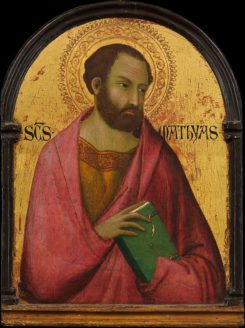March 18, 2023
St. Cyril (315?-386) was born of a Christian family in Jerusalem, where he received a good education. He was ordained a priest, and given the task of teaching catechumens who were preparing to be baptized at the Easter Vigil. Cyril’s teachings were later collected in written form, and are important examples of the Church’s ritual and theology in the fourth century.
In 348 Cyril was installed as bishop of Jerusalem, and soon became involved in the Arian controversy. The heresy of Arianism, which denied the divinity of Jesus (and was named after a priest named Arius), spread throughout much of the Roman Empire; many bishops and clergy became Arians, and engaged in a power struggle with those who remained true to the Church’s teaching. For a time the Arians were more successful, and Cyril and other orthodox bishops experienced persecution and exile.
Cyril was banished three different times for refusing to accept Arian teachings (and ironically, he himself was once wrongly accused of Arian sympathies). After returning to Jerusalem following his third exile, Cyril devoted himself to restoring order and to teaching true doctrine. He participated in the Council of Constantinople in 381, which emphasized Jesus’ divinity and equality with God the Father. St. Cyril died in 386, and is considered a Doctor (an eminent and reliable teacher) of the Church.
Lessons
1. Training and welcoming new members is an important part of the Church’s mission; the early catechumenate process, which St. Cyril was involved in, has been restored today in the R.C.I.A. (Rite of Christian Initiation for Adults).
2. A desire to serve God faithfully is no guarantee of popularity or success within the Church; Cyril experienced persecution precisely because he insisted on upholding true Christian doctrine.
From Johnnette Benkovic’s Graceful Living: Meditations to Help You Grow Closer to God Day by Day
“Confess what you have done in word or deed, by night or day. Confess in an acceptable time, and in the day of salvation receive the heavenly treasure.”
—St. Cyril of Jerusalem, Catechetical Lectures
Johnnette’s Meditation
How does this quote speak to me specifically today? How recently have I gone to confession? Should I go more frequently?
Other Saints We Remember Today
Our Lady of Mercy





